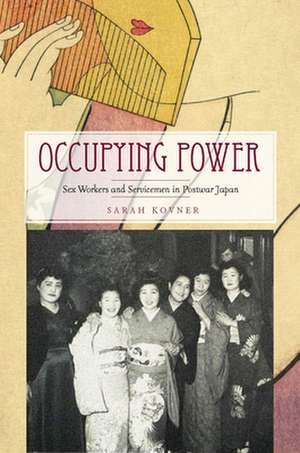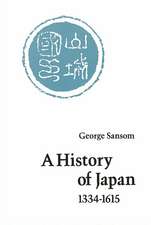Occupying Power: Sex Workers and Servicemen in Postwar Japan: Studies of the Weatherhead East Asian Institute
Autor Sarah Kovneren Limba Engleză Paperback – 6 mar 2013
The year was 1945. Hundreds of thousands of Allied troops poured into war-torn Japan and spread throughout the country. The effect of this influx on the local population did not lessen in the years following the war's end. In fact, the presence of foreign servicemen also heightened the visibility of certain others, particularly panpan—streetwalkers—who were objects of their desire.
Occupying Power shows how intimate histories and international relations are interconnected in ways scholars have only begun to explore. Sex workers who catered to servicemen were integral to the postwar economic recovery, yet they were nonetheless blamed for increases in venereal disease and charged with diluting the Japanese race by producing mixed-race offspring. In 1956, Japan passed its first national law against prostitution, which produced an unanticipated effect. By ending a centuries-old tradition of sex work regulation, it made sex workers less visible and more vulnerable. This probing history reveals an important but underexplored aspect of the Japanese occupation and its effect on gender and society. It shifts the terms of debate on a number of controversies, including Japan's history of forced sexual slavery, rape accusations against U.S. servicemen, opposition to U.S. overseas bases, and sexual trafficking.
Occupying Power shows how intimate histories and international relations are interconnected in ways scholars have only begun to explore. Sex workers who catered to servicemen were integral to the postwar economic recovery, yet they were nonetheless blamed for increases in venereal disease and charged with diluting the Japanese race by producing mixed-race offspring. In 1956, Japan passed its first national law against prostitution, which produced an unanticipated effect. By ending a centuries-old tradition of sex work regulation, it made sex workers less visible and more vulnerable. This probing history reveals an important but underexplored aspect of the Japanese occupation and its effect on gender and society. It shifts the terms of debate on a number of controversies, including Japan's history of forced sexual slavery, rape accusations against U.S. servicemen, opposition to U.S. overseas bases, and sexual trafficking.
| Toate formatele și edițiile | Preț | Express |
|---|---|---|
| Paperback (1) | 210.70 lei 6-8 săpt. | |
| Stanford University Press – 6 mar 2013 | 210.70 lei 6-8 săpt. | |
| Hardback (1) | 644.44 lei 6-8 săpt. | |
| Stanford University Press – 7 feb 2012 | 644.44 lei 6-8 săpt. |
Din seria Studies of the Weatherhead East Asian Institute
-
 Preț: 267.74 lei
Preț: 267.74 lei -
 Preț: 160.40 lei
Preț: 160.40 lei -
 Preț: 267.31 lei
Preț: 267.31 lei -
 Preț: 212.43 lei
Preț: 212.43 lei -
 Preț: 239.61 lei
Preț: 239.61 lei -
 Preț: 172.24 lei
Preț: 172.24 lei -
 Preț: 211.83 lei
Preț: 211.83 lei - 23%
 Preț: 507.74 lei
Preț: 507.74 lei -
 Preț: 518.09 lei
Preț: 518.09 lei - 19%
 Preț: 645.98 lei
Preț: 645.98 lei - 19%
 Preț: 446.01 lei
Preț: 446.01 lei - 19%
 Preț: 505.45 lei
Preț: 505.45 lei - 5%
 Preț: 214.33 lei
Preț: 214.33 lei - 19%
 Preț: 567.04 lei
Preț: 567.04 lei - 46%
 Preț: 116.77 lei
Preț: 116.77 lei -
 Preț: 142.85 lei
Preț: 142.85 lei - 7%
 Preț: 323.97 lei
Preț: 323.97 lei - 14%
 Preț: 457.41 lei
Preț: 457.41 lei - 17%
 Preț: 154.26 lei
Preț: 154.26 lei - 23%
 Preț: 571.41 lei
Preț: 571.41 lei - 21%
 Preț: 257.40 lei
Preț: 257.40 lei
Preț: 210.70 lei
Nou
Puncte Express: 316
Preț estimativ în valută:
40.32€ • 41.94$ • 33.29£
40.32€ • 41.94$ • 33.29£
Carte tipărită la comandă
Livrare economică 14-28 aprilie
Preluare comenzi: 021 569.72.76
Specificații
ISBN-13: 9780804788632
ISBN-10: 0804788634
Pagini: 240
Dimensiuni: 152 x 229 x 18 mm
Greutate: 0.34 kg
Editura: Stanford University Press
Colecția Stanford University Press
Seria Studies of the Weatherhead East Asian Institute
ISBN-10: 0804788634
Pagini: 240
Dimensiuni: 152 x 229 x 18 mm
Greutate: 0.34 kg
Editura: Stanford University Press
Colecția Stanford University Press
Seria Studies of the Weatherhead East Asian Institute
Recenzii
"Sarah Kovner's path breaking study of the Japanese sex industry during the Allied occupation brings to light that the Japanese historical toleration of state-regulated prostitution nonetheless has its limits when confronted with a new reality . . . Occupying Power: Sex Workers and Servicemen in Postwar Japan otherwise makes a compelling case and should be regarded as an indispensable read for all students who explore the history of commercial sex in Japan, the Asia-Pacific region, and beyond."—Yuma Totani, American Historical Review
"Overall, Occupying Power is a new and important addition to the recently growing literature of the social and grassroots history of postwar Japan . . . The book further deserves praise for incorporating up-to-date developments in the fields of women's, feminist, and sexuality studies, as well as empire and nationalism studies, into the study of occupied Japan, making the book multidisciplinary by nature. Without doubt, therefore, Occupying Power should attract a wide audience in diverse fields."—Hajimu Masuda, H-War
"With rich data and numerous insights, Occupying Power offers a valuable contribution on a number of levels . . . The book contains detailed descriptions of the complex history of sex work under the Allied Occupation in vivid narratives, which makes it an accessible and useful resource for anyone who is interested in Japanese history and the politics of sex work . . . Kovner's careful and nuanced analysis successfully complicates and challenges conventional approaches for understanding sex work and sex workers in Japan and beyond."—Kimiko Osawa, Pacific Affairs
"Occupying Power offers the academic researcher a treasure trove of facts, materials, and provocative interpretations."—Franziska Seraphim, Journal of Asian Studies
"Monumenta Nipponica
"Kovner's detailed analysis of this movement and the politics of prostitution is illuminating, explaining how sex industry bribery of Diet members facilitated crucial compromises ensuring that outlawing sex work in 1956 had limited practical impact."—Jeff Kingston, The Japan Times
"Occupying Power addresses an important subject, the multiple roles and shifting statuses of sex work in occupation-era Japan. . . [P]repares the ground for global perspectives and comparisons on sex work wherever occupation has occurred. Students and scholars will find the book a welcome addition to their readings in the modern history of Japan and the still understudied occupation era in particular. . .[M]akes an exciting contribution to women's, feminist, and sexuality studies."—Sabine Frühstück,Journal of Japanese Studies
"Relying on a range of Japanese- and English-language sources, this succinct volume offers a thick analysis of sex work in Japan from political, social, economic, and symbolic viewpoints. . . . Occupying Power is literally a powerful book that adds important insight to the fields of modern Japan, women's studies, and 'America in the world.' This study deserves a wide audience."—Hiroshi Kitamura, Diplomatic History
"It is well-researched, thoughtful and courageous, and provides much material for scholarly and social debate. Occupying Power nicely complicates our understanding of the power dynamics of occupation, and of the place of sexual interactions within those dynamics . . . I hope that Kovner's research inspires further interrogations of sexual relations under military occupation."—Christine de Matos, Japanese Studies
"[Kovner] reaches for and firmly grasps interconnections, whether across national boundaries or periods of time, and frequently with an eloquence that requires rereading and sharing. . . . The rave reviews coming in from leading scholars suggest that Kovner already has vaulted into the front ranks of Japanese scholarship. Summing Up: Essential."—R. B. Lyman Jr., CHOICE
"Kovner's detailed analysis of this movement and the politics of prostitution is illuminating, explaining how sex industry bribery of Diet members facilitated crucial compromises ensuring that outlawing sex work in 1956 had limited practical impact."—Jeff Kingston, The Japan Times
"Occupying Power addresses an important subject, the multiple roles and shifting statuses of sex work in occupation-era Japan. . . [P]repares the ground for global perspectives and comparisons on sex work wherever occupation has occurred. Students and scholars will find the book a welcome addition to their readings in the modern history of Japan and the still understudied occupation era in particular. . .[M]akes an exciting contribution to women's, feminist, and sexuality studies."—Sabine Frühstück,Journal of Japanese Studies
"Relying on a range of Japanese- and English-language sources, this succinct volume offers a thick analysis of sex work in Japan from political, social, economic, and symbolic viewpoints. . . . Occupying Power is literally a powerful book that adds important insight to the fields of modern Japan, women's studies, and 'America in the world.' This study deserves a wide audience."—Hiroshi Kitamura, Diplomatic History
"It is well-researched, thoughtful and courageous, and provides much material for scholarly and social debate. Occupying Power nicely complicates our understanding of the power dynamics of occupation, and of the place of sexual interactions within those dynamics . . . I hope that Kovner's research inspires further interrogations of sexual relations under military occupation."—Christine de Matos, Japanese Studies
"[Kovner] reaches for and firmly grasps interconnections, whether across national boundaries or periods of time, and frequently with an eloquence that requires rereading and sharing. . . . The rave reviews coming in from leading scholars suggest that Kovner already has vaulted into the front ranks of Japanese scholarship. Summing Up: Essential."—R. B. Lyman Jr., CHOICE
Notă biografică
Sarah Kovner is Assistant Professor of History and Asian Studies at the University of Florida.
Descriere
Ordinary women helped restart Japan's postwar recovery by selling sex to Allied servicemen, but they were sacrificed as symbols of national shame by a country that has yet to recover full sovereignty.
















